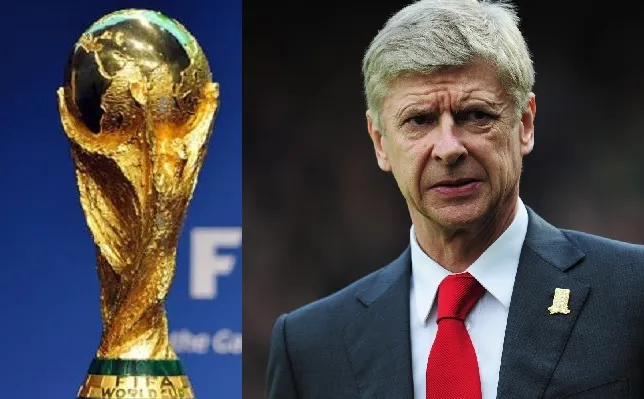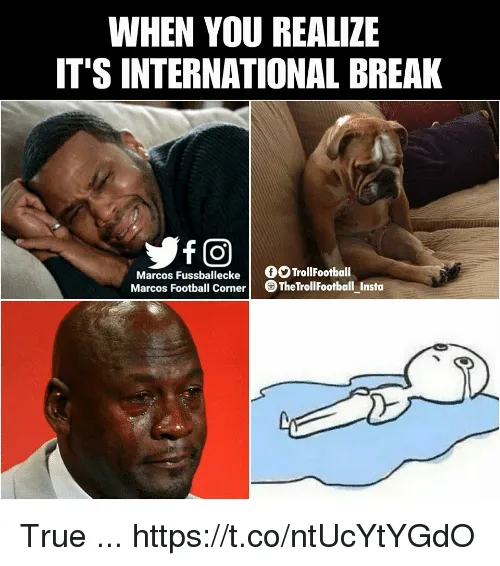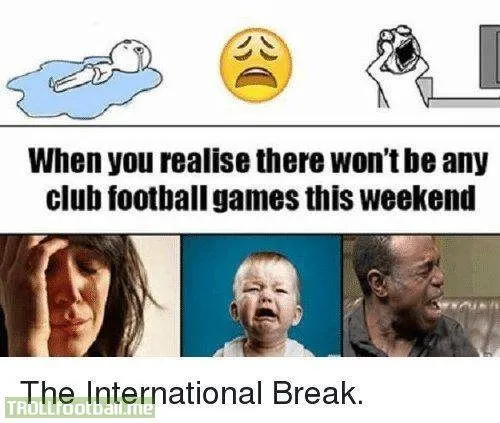Let me start by professing that I know where most people stand on this.
When I decide to write about this, I was expecting to write a post summarising everything and reach a quick conclusion only to find a much deeper issue at play.
This post will be a series of three parts. One which will go through the full issue with international football, another that will discuss all the negative aspects of it, and a third that will actually highlight the positives of it. The last part will be accompanied by my conclusion.
The Issue With Internation Football
I don't think there's something that sums up the issue with international football breaks more than the memes that come out whenever there's time for one.
The issue with the international football breaks is that
- A) Well, they're mostly boring.
And
- B) Clubs suffer thanks to them from players' injuries.
Some clubs often find themselves in disputes with international FAs with certain players are asked for, arguments over injuries, and having to deal with fatigued players.
A General Solution
On the 4th of October 2017, sports journalist Tim Wigmore wrote an article for the Independent. In the article he detailed the issue and proposed a suggestion to fix the issue holding back international football. The suggestion can be summed up as followed:
Remove all international breaks throughout the season.
Play all international games after the end of the season.
Two points in which we will dive now
Remove all international breaks throughout the season.
When you remove the international breaks during the season you save up at least 7-9 weeks instantly. If we average this, it could mean the season would end in late April rather than the usual late June.
Players will take a two-week break into mid-May.
Play all international games after the end of the season.
After the two-week break, international teams would have another 2 weeks of preparation ahead of whatever qualification matches they might have to play.
Benefits to the suggestion
- Injuries will decrease throughout the season
- Decrease of time wasted in flights between the club and international team camp
- Disputes between clubs and FAs will decrease over players call-ups
- The leagues will be more competitive and exciting
- There will be a real chance for international teams for trial and error as players would spend a month and a half together.
- International players' form will be better, therefore the games will be more exciting
The Issue with the Suggestion
There are two ways to go about doing the end-of-season international games. Either A) Hosting the games in one place. Or B) Continue with the home and away system in current qualifiers. Each of those comes with its selective issue.
Hosting the games in one place
You will need to work out the logistics of hosting such an event across multiple countries that are close to each other as you can't realistically host it in one country. No country has the infrastructure to host all the games and accommodate all the international fans.
Another issue is that aside from the hosting countries, no international team will get to play at home. This renders so much work on football infrastructure pointless and also eliminates the chance of the less fortunate countries from having the people seeing their international team play live.
Continue with the home and away system in current qualifiers.
This one will have all the aforementioned benefits, except it will have all the downside of increased time wasted in flights and all the subsequential aftermath that comes with that.
What Does All of That Have to do With The World Cup Idea?
The reason Tim Wigmore's article in specific is mentioned is that it served as the seed with which Saudi Arabia suggested to Fifa the reproposal of playing a World Cup every two years. We will come back to that reproposal part later.
If you are unaware of the proposal, here's a quick rundown. Last May, Saudi Arabia proposed World Cups happening every two years to Fifa. Fifa president Gianni Infantino and Chief of Global Football Development Arsène Wenger said that they will seriously consider the proposal.
So much so that Wenger held a meeting with his team and the media in which he discussed in detail the proposal.
Wenger relayed the same idea laid by Wigmore with one main change:
Instead of having international games, friendlies, and qualifiers, played in the summer, they will be played in October.
The World Cup will happen every even year while the remaining tournaments, such as the continental tournaments, will be played in odd years. The proposal also erases new tournaments and championships such as the Europe Nations League.
Why did I say "Reproposal"?
Over 20 years ago, Sepp Blatter, Fifa's president at the time has actually pushed to make the World Cup a competition that happens every two years. So, this wasn't the first, second, or even third instance where the suggestion was made.
In Conclusion
In theory, the new proposal will have made the most of the football schedule. Maximizing benefits from time year-round. In October you will have your qualifiers and friendlies, throughout the season you will have your club leagues and European competitions, and in the summer you will have an international tournament, be it the World Cup, or any of the continental competitions.
There are a lot of issues to discuss regarding this subject. Issues like whether this would cause the World Cup to lose its magic, whether it will save international football, whether it is even rationally possible. As well as the subject of football viewership declining, even more so in younger demographics. All of those will be covered in the next parts as we discuss the cons and pros of such a proposal.



